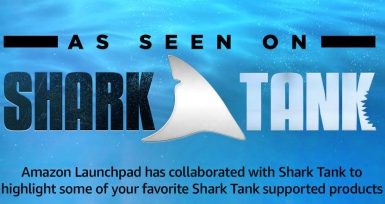 Beyond the Tank episode 111 aired January 28, 2016. It is the fifth episode of the “second season” of the hit show. Four past Shark Tank companies get an in-depth, 12 minute update segment on what their life is like after Shark Tank and viewers get to see them interacting with their investor/sharks. Beyond the Tank episode 111 features a look at Mark Cuban’s season 3 investment in Tower Paddle Boards. We also see Lori Grenier and Squatty Potty continue their fantastic success. Robert Herjavec invested in Grill Charms back in season 2 and he shares the story of how entrepreneur Leslie Heywood licensed the business. Mr. Wonderful invested in Wicked Good Cupcakes in season 4; we’ll see their continued success story play out.
Beyond the Tank episode 111 aired January 28, 2016. It is the fifth episode of the “second season” of the hit show. Four past Shark Tank companies get an in-depth, 12 minute update segment on what their life is like after Shark Tank and viewers get to see them interacting with their investor/sharks. Beyond the Tank episode 111 features a look at Mark Cuban’s season 3 investment in Tower Paddle Boards. We also see Lori Grenier and Squatty Potty continue their fantastic success. Robert Herjavec invested in Grill Charms back in season 2 and he shares the story of how entrepreneur Leslie Heywood licensed the business. Mr. Wonderful invested in Wicked Good Cupcakes in season 4; we’ll see their continued success story play out.
Each Episode of Beyond the Tank has these “back stories” and Shark Tank updates. We’ll recap them here.
Beyond the Tank Episode 111 Featured Sharks
- Investor – Kevin O’Leary
- Investor – Mark Cuban
- Investor – Lori Grenier
- Investor – Robert Herjavec
Beyond the Tank Episode 111 Featured Entrepreneurs
- Company – Grill Charms
- Company – Squatty Potty
- Company – Tower Paddle Boards
- Company – Wicked Good Cupcakes
Beyond the Tank Episode 111 Recap
Tower Paddleboards
Stephan Aarstol came to the Shark Tank in Season 3. When he was on the stage, he was so nervous he froze up, having difficulty to get through his presentation. Despite his momentary hiccup, Mark Cuban offered him $150,000 in return for 30% of the company.
“When Stephan came on,” remembers Mark, “He was a mess. But sometimes it’s not about the quality of the presentation. It’s about the entrepreneur.”
When Stephan brought Tower Paddleboards to the Shark Tank, he’d achieved $265,000 in sales. Within a year, he’d grown to $1.7 million, and current sales have cleared $5 million. Stephan’s dreams are large. He believes that, selling paddleboards alone, he could grow to a $10 million dollar company. “But if I can make a $10 million company, why not make a $100 million company?” He hopes to build the brand beyond paddleboards, to a “beach lifestyle” brand.
Mark’s coming to visit and talk about the potential expansion, as well as an Amazon deal.
Mark’s excited to see the warehouse for the first time since a recent expansion. He knows what Stephan’s up against as a very-successful entrepreneur. “The issue Tower Paddle is facing today is one that most start-ups that have had early success face: how do you keep accelerating your growth.”
Stephan brings out the inflatable paddleboards that Mark’s initial investment helped fund. Mark is impressed. “One of the points I always make is that you have to re-earn your customer’s business every day, and the good news is, Stephan has that approach to business.”
With Mark impressed with the current progress and new products, it’s time for Stephan to present his view of the future. He asks Mark, “The question is, are we a mature $10 million company, or a startup $100 million company?” He presents the lines he believes are Tower Paddleboard’s new frontiers: skateboards, apparel, sunglasses, liquor, and even resort hotels.
“Tower,” says Stephan, “We’re going to drop the ‘Paddleboards,” says Stephan, “And we’re going to have 20, maybe 30, brands underneath.”
Mark feels Stephan is trying to do too much, too fast. “Right now,” he says, “the paddleboard business is doing well. They’re selling. Don’t mess up the cash cow.”
Mark explains that when he markets the Mavericks, he sells experiences. In order to create the brand, he hosts and creates events, to draw the customer in. He suggests that Stephan take a similar approach, creating Tower brand events, and building a lifestyle brand from there. Stephan is enthusiastic about the idea.
Next, Stephan brings up the Amazon deal. He’s been offered an opportunity to take part in a pilot program. In the past year, they’ve sold $2 million on Amazon. It would cost an additional 5% of sales. Mark tells him that the issue is “scale,” that the additional sales from the extra exposure Amazon is offering will more than cover the extra percentage.
“I’m really excited, because Amazon is the best in the world, when it comes to online transactions, and Stephan is the best in the world when it comes to selling stand up paddleboards, and I think that the two of them together are going to do something special.”
The deal is a go, and Stephan is looking forward to nearly doubling his sales, from an estimated $6.9 million to $9.6 million with the additional Amazon sales.
“The bottom line is, I trust you,” says Mark. “You’ve returned my money many times over already.”
Stephan appreciates Mark’s help. “We got the money from you, but the expertise we got from you is much more valuable.”
Stephan heads out to Seattle, to talk to Amazon to have a meeting about the Amazon Exclusives Program. They discuss the cost, and what would be included in the deal. The deal will provide a larger exposure for Tower’s products, and Fulfillment by Amazon, which speeds shipping for the end customer. Stephan signs the deal.
“This could be the fastest way to build a brand that’s ever been invented,” he says.
He celebrates by taking some of the Amazon executives paddleboarding.
Mark Cuban is happy with his deal, and excited for the future. “Tower Paddleboards start off as a stand-up paddleboarding company, and the key for Stephan is to keep growing. There’s nothing holding him back, and the best is yet to come.”
Squatty Potty
Bobby and Judy Edwards came to Shark Tank in Season 6. They were able to land a deal for $350,000 in return for 10% of the business with Lori Greiner.
“I invested in the Squatty Potty because Bobby and Judy really believe in their product, they want to help people, and they have a passion, and a drive, to get it out there across America, to everybody,” says Lori.
In three years before Shark Tank, the Squatty Potty had done $6 million in sales. “Sales after Shark Tank,” says Judy, “were unbelievable. It really caught us with our pants down, no pun intended.”
Within 4 days, they’d completely sold out of Squatty Potties. In a few months, they’d done over $5 million in sales. Currently, the annual sales projection is $12 million.
The pair have a larger version. They want to take Squatty Potty to the next level. “We have kind of a cult following,” says Bob. “It’s time to take it to the mainstream.”
Marketing has proven challenging. Since the product deals with a common but potentially embarrassing problem- constipation, many of the sponsors put restrictions upon the language that can be used in promotions.
Lori’s coming to visit, to consult with the pair and talk about moving forward. “This might be a make or break moment for the company,” she says. “If we don’t spread the word about Squatty Potty, we may plateau at a certain level of sales.”
Lori tells the couple their company took off right out of the gate. “I have never had a product do such amazing numbers the first night of Shark Tank and the few weeks after,” she says. “I think it’s the highest one, ever.”
The company sold $1 million the night of Shark Tank, and $3 million in the two weeks after.
Lori is familiar with the taboo that has limited marketing. She believes that an infomercial might be the way to educate the public and improve their marketing.
Bob explains that their first experience with infomercials was disappointing. After spending hundreds of thousands of dollars, the poor results forced them to end the contract with that infomercial company. A few months later, the company released a nearly-identical commercial for a product very similar to Squatty Potty. The experience has left the pair leery of infomercials.
Lori understands their concerns, and reassures them that their strong patents are designed to prevent just that kind of problem in the future. The pair is willing to listen to her advice.
“I really feel that Lori’s listening to us,” says Bob. “And it’s nice to have her on our side.”
“Yeah, “ agrees Judy. “It’s nice to have a Shark on your team that will listen to you; as well as bring a lot to the table herself.”
Lori recommends that the pair create videos themselves, and put them on the website and on social media. “Why not use the internet to get our message out there,” says Lori. “And maybe it’ll go viral.”
The three discuss potential designs for the video. Lori is going to help the pair make the video. “There’s nothing I love more than the production side,” says Lori. “It goes back to my roots.”
Several weeks later, the trio come together again, this time to create the new video.
“The idea of these videos,” says Judy, “Is to make Squatty approachable.”
Bob agrees. “[We hope to] drive awareness to our brand, educate, and hopefully be funny at the same time.”
Lori is having a great time helping with the video. “This is totally my area of expertise,” she says. “I have 18 years of experience selling on TV, of creating videos, of selling online. I’m the right Shark for this.”
The video will go out on social media, spreading education and brand awareness to potentially hundreds of millions of people.
“We’re number one, in the number two business,” quips Lori.
Judy and Bob couldn’t be happier with their progress.
“Our goal,” says Bob, “ is really to make Squatty Potty a household name. A Squatty Potty around every toilet.”
“Healthy colon,” the pair choruses, “Happy lives.”
Grill Charms
Leslie Haywood came to the Shark Tank in Season 1. She came to the Tank with $60,000 in sales. She landed a deal with Robert Herjavec for $50,000 for 25% of her company.
“I invested in Grill Charms,” says Robert, “Because I think it’s a good product, but it started with Leslie. Sometimes you come out and you love the product, and you don’t know about the person behind it. With Leslie, she just fills the room. She came into the room, and she was all “Hi, ya’ll!” and it was just infectious.
Within a few months of airing on Shark Tank, Leslie’s sales had jumped to over $300,000. The growth has had an impact upon Leslie’s family.
“I had been doing Grill Charms for a couple of years, and it had started out really slow, but then Shark Tank happened, and all of a sudden I was getting calls from all over the US. I just couldn’t believe the response and how the public really got behind the product. But, I was doing it all by myself, all while trying to juggle everything that I had with the kids, and the company was starting to require more than I was able to give. The sacrifices I was making at home were becoming more evident with the children, and that’s when I knew that something had to change.”
Leslie entered a licensing deal with Fox Run Brands. She felt guilty for giving up control of something she’d created. Robert, however, was supportive.
“Leslie got to a point where her personal life was more important than necessarily running the business. I respect her for it, and I admire her for it. It’s a personal decision, and Leslie decided it was the right thing for her at the time. People often ask me, is there a balance in life when you start a business, and I say, if you’re expecting a balance, don’t start a business.
Although Leslie initially questioned her decision, she soon decided she’d done the right thing.
“A good entrepreneur,” she says, “knows when they are the best person to run the company, and a great entrepreneur knows when to give that up. Right now, this is where I need to be.”
Wicked Good Cupcakes
Mother and daughter team, Tracey Noonan and Danielle Vilagie came to the Shark Tank in Season 4, and landed a deal with Mr. Wonderful, Kevin O’Leary. It was an unusual move for O’Leary. He normally turns his nose up at un-patentable products, but in this case he made an exception, exclaiming “That is one damn good jar of cake.”
“Cupcakes,” he explains, “are a commodity. You can’t patent cupcakes. What Dani and Tracey did, is they turned it into a gifting item. How pure and simple, and how profitable.”
Kevin offered them a royalty deal for $1 a jar. The pair quibbled, and talked him down to $.45 a jar, landing one of the sweetest deals to date on Shark Tank.
“The reason Wicked was all about a royalty,” explains Kevin, “is I felt this would remain a family business forever. Once you bring someone in as an equity investor, they have to have an exit strategy. You have to sell the business one day. I could sense that was not what they wanted to do, so how could I invest, and get my money back? Bing, royalty deal.”
The deal was the first ever royalty deal on Shark Tank. Previous to Shark Tank, the pair had done $300,000 in sales. Their current projection is $5 million.
“We were so successful,” says Tracey, “That we were able to pay Kevin back in six weeks flat.
Scott, Tracey’s husband, Scott, came on board as a CFO and CEO, giving up his own job to join the company. Between Scott, and Tracey’s father, a former CEO in his own right, they’ve had a solid support system for the business.
The pair has come up with a powdered cake mix, in hopes of breaking in to the big box stores. The second idea for expansion is “Samantha’s Cookie Jar,” a jar that comes loaded with chocolate-dipped cookies. The hope is that the cookies will appeal to corporations as holiday gifts, since they allow a logo to be placed on the cookie.
The entrepreneurs hope to get Kevin’s feedback and blessing on their ideas for expansion during their upcoming meeting.
Kevin is excited to check in on Wicked Good. “This has been a phenomenal success,” he says. “It’s been a monster hit for me.”
The pair shows him around, giving him a tour of the kitchens where they still sell custom cakes, as well as hand packing the Wicked Good Cupcakes, before getting down to business.
Scott goes over the numbers, talking about the roughly 600% growth the company enjoyed with the so-called Shark Tank effect in the year after their episode first aired. The company projects sales of $3.5 million in the current year.
“This is living proof,” says Kevin, “That Mr. Wonderful’s royalty deal is king.”
Kevin tells Tracey and Scott that once they hit $10 million in sales, they will have arrived as a national brand. He believes it could happen in as little as six months.
This is the opening Tracey needs. She tells Kevin that the pressure to innovate keeps her up at night, and that she has ideas that will “make you richer” and continue to grow the business.
She presents the ideas for a line of cake mixes and frostings, in an effort to get into big box stores.
Kevin is not on board. “That is a very competitive commodity business, where the shelf space is owned by some really big companies that will crush you like a cockroach.”
He doesn’t believe they can get the shelf space. Danni agrees with Kevin, and the powdered cake mix idea is shelved for now. They move forward, presenting Kevin with Samantha’s Wicked Good Cookie Jars. With shelf life of 6-9 months on the packaged cookies, and refills available for the initial jar, Kevin believes corporations will buy the jars. There’s some risk in investing $50,000 in the machinery to purchase the chocolate-coating machines, but Tracey is confident.
“There’s always a risk in growing your business,” she says “But it’s a risk that you have to take, and I don’t want to stop until we’re at the top of our game, and we’re as big as we possibly can be.”
Kevin loves the cookies. “This opportunity is huge,” he says. “I’d like to see it work.”
They celebrate with a jam session, Kevin showing off his talent on an electric guitar, accompanied by Scott and Tracey on drums. It looks as if the Shark and Wicked Good Cupcakes will continue making beautiful music together for years to come.







Recent Comments